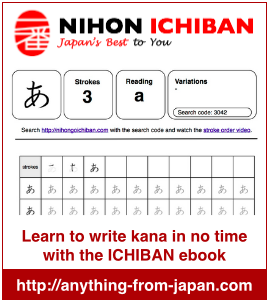All about the grammar of verbs for the JLPT N5
This is a list of grammar for verbs required to pass the JLPT N5. Place the curser above the grammar form name to get more detailed information.
VERB + masu-form (〜ます)
| Kanji | 私は毎日新聞を読みます。 |
| Furigana | わたしはまいにちしんぶんをよみます。 |
| Romaji | watashi wa mainichi shinbun o yomimasu. |
| English | I read newspaper every day. |
VERB + masen (〜ません)
| Kanji | 私の母はアルコールを飲みません。 |
| Furigana | わたしのはははアルコールをのみません。 |
| Romaji | watashi no haha wa arukooru o nomimasen. |
| English | My mother does not drink alcohol. |
VERB + mashita (〜ました)
| Kanji | 私は昨日本を買いました。 |
| Furigana | わたしはきのうほんをかいました。 |
| Romaji | watashi wa kinou hon o kaimashita. |
| English | I bought a book yesterday. |
VERB + masen deshita (~ませんでした)
| Kanji | 私はまだ朝ご飯を食べませんでした。 |
| Furigana | わたしはまだあさごはんをたべませんでした。 |
| Romaji | watashi wa mada asagohan o tabemasen deshita. |
| English | I have not yet eaten breakfast. |
VERB + plain form
| Kanji | 日本人は毎日御飯を食べる。 |
| Furigana | にほんじんはまいにちごはんをたべる。 |
| Romaji | nihonjin wa mainichi gohan o taberu. |
| English | Japanese eat rice every day. |
VERB + NAI form (~ない)
| Kanji | 私の父はテレビを見ない。 |
| Furigana | わたしのちちはテレビをみない。 |
| Romaji | watashi no chichi wa terebi o minai. |
| English | My father does not watch TV. |
VERB + TA FORM (~た)
| Kanji | 私は新聞を読んだ。 |
| Furigana | わたしはしんぶんをよんだ。 |
| Romaji | watashi wa shinbun o yonda. |
| English | I read a newspaper. |
VERB + nakatta FORM (~なかった)
| Kanji | 私はまだ食べなかった。 |
| Furigana | わたしはまだたべなかった。 |
| Romaji | watashi wa mada tabenakatta. |
| English | I have not eaten yet. |
VERB + te FORM (~て)
| Kanji | 朝ご飯を食べて学校に行きました。 |
| Furigana | あさごはんをたべてがっこうにいきました。 |
| Romaji | asagohan o tabete gakkou ni ikimashita. |
| English | I went to school after eating breakfast. |
VERB + TE ARU(~てある)
| Kanji | このノートに漢字が書いてあります。 |
| Furigana | こののーとにかんじがかいてあります。 |
| Romaji | kono nooto ni kanji ga kaite arimasu. |
| English | There is a kanji writing on this notebook. |
VERB + TE iRU(~ている)
| Kanji | 私は新聞を読んでいます。 |
| Furigana | わたしはしんぶんをよんでいます。 |
| Romaji | watashi wa shinbun o yonde imasu. |
| English | I am reading a newspaper. |
VERB + naide(~ないで)
| Kanji | 朝ご飯を食べないで学校に行きました。 |
| Furigana | あさごはんをたべないでがっこうにいきました。 |
| Romaji | asagohan o tabenaide gakkou ni ikimashita. |
| English | I went to school without eating breakfast. |


Ohayou gozaimasu
Before anything else, Congratulations for this wonderful site.
I was reading this part on grammar and I think you have mistyped the translation:
VERB + nakatta FORM (~なかった)
Kanji: 私はまだ食べなかった。
Furigana わたしはまだたべなかった。
Romaji watashi wa mada tabenakatta.
English: I have not year eaten.
I think It is not right.
Could be: I have not eaten yet? I don’t know… “Year” doesn’t fit there!
Yes, you are right. There is a spelling mistake. I will correct it immediately. Thank you very much for pointing it out.
有難う。復習として、とても嬉しい‼(^-^)
This is sooo useful! Thank you for sharing this!
But, I think a better way to say “There are Kanji write on this notebook” may be “There is Kanji writing on this notebook” or “There are Kanji characters on this notebook.” While I understand what it means, the original sentence just sounds a bit weird.
Thanks. You are right – the English sentence looks a bit strange. I corrected it using your proposal.
Thank you very much.
It could be better if it was written as-There is a kanji written on this notebook.Anyway it’s the best site.
Thanks for the improvement idea. We already changed it.
好东西啊~
thank you so much for this site! It was really something I needed!
this is so helpful you have no idea what this means to me … i know a little japanese from the manga and anime .. i can read and understand the basics .. but what i needed was the entire syllabus so that i could confidently take the jlpt dec .. please keep posting other information if you think this site does not completely cover the syllabi…. i will keep checking your site .. thanks again.
cheers
varun.
this site is very amazing ..:D this is what i need to intense my nihongo frequency ..!!!
Yattah ..:D Domo arigato ni kimi ga .. \\^O^// ..:D
This is a wonderful site and well written. Just one little point about the last box on this page; shouldn’t it read “VERB+naide (~ないで)” rather than “(~ていで)”?
素晴らしいサイトをありがとうございます!
Hello,
Thank you for noticing the mistake and for liking Nihongo Ichiban! 🙂
Best regards
thanks for simple method
This web helpful and nice method. (y)
Well, can you explain each grammar, please?
Like …VERB + masen (〜ません)–> Negative form. Use when …..
So difficult if i just learn from one example without explaining. Thank you…
where can i find the masu form of every dictionary form of a japanese verb.
for example: taberu (dictionary form)
tabemase (masu form)
It really help me to learn, but can you explain about “why should we use this form?” or maybe “this form function is….” maybe it’ll really help a beginner for pass jltp n5 more 🙂
Hi, I just found this site. If I buy the JLPT N5 book, does it have the same structure as above?
Example: Kanji/ Furigana/ Romaji/ English
Can you suggest any other books. I am toddler level Japanese. Need to work more on conversation/ vocab. more than anything.
Thanks for your time and hard work. I’ll check back.
Hello,
If you are talking about the N5 103 Kanji book available on this site, it is free and on the download page you can see a few example of the pages.
I have looked into the ~te iru (~ている) form. I think there needs to be a note there explaining that this form is not always a straight translation from “VERBing” to “VERBte iru”.
i’d love to learn japanese so much, but i dont knw where to start, please could you guys provide me some tips from where to start and probably link me some of your tutotial books. Thanks